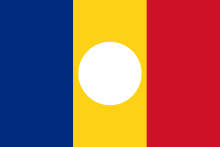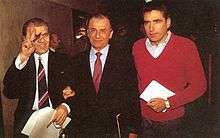National Salvation Front (Romania)
The National Salvation Front (Romanian: Frontul Salvării Naționale, FSN) is the name of a political organization that was the governing body of Romania in the first weeks after the Romanian Revolution in 1989. It subsequently became a political party, and won the 1990 election under the leadership of then-President Ion Iliescu.
National Salvation Front Frontul Salvării Naționale | |
|---|---|
| Abbreviation | FSN |
| Co-leaders | Ion Iliescu, Petre Roman, Dumitru Mazilu |
| Founded | 22 December 1989 |
| Dissolved | 1993 |
| Succeeded by | Democratic Party |
| Headquarters | Bucharest |
| Ideology | Communism (before 1990[1]) Post-communism (after 1990) Social democracy Democratic socialism[2] Big tent |
| Political position | Centre-left to Left-wing (since 1990) Left-wing to Far-left (until 1990) |
| Colours | Blue, yellow, red (Romanian Tricolour) |
| Party flag | |
 The flag of the Revolution (1989), without the coat of arms. | |
In 1992, some members of the Front, including President Iliescu, broke away from it, forming the Democratic National Salvation Front. In 1993 the remaining FSN was renamed as the Democratic Party.
The National Salvation Front is the common ancestor of two of the largest active political parties in Romania today: the Social Democratic Party and the National Liberal Party (after the merger of the Democratic Liberal Party with the National Liberal Party).
History
Formation and rise to power
In March 1989 six prominent members of the Romanian Communist Party wrote an open letter to President Nicolae Ceaușescu that criticised his abuses of power and his economic policies. The so-called "Letter of the Six" was circulated in the Western media and read on Radio Free Europe.
In 1989, before the 14th Congress of the Romanian Communist Party, two letters signed "National Salvation Front" began circulating. They were read on Radio Free Europe on 27 August and 8 November.[3] The first letter had a number of questions about Ceaușescu's mismanagement of the economy and human rights violations, while the second letter appealed to the Congress not to re-elect Ceaușescu.[3]
Largely, the purpose of the organization was out of resentment toward Ceaușecu rather than resentment toward communism. Members of the National Salvation Front such as Silviu Brucan and Ion Iliescu believed strongly that the revolution would keep communism alive, emphasizing a structural change in agriculture and trade organization.[4] People flocked to the National Salvation Front for a multitude of reasons ranging from religious oppression in members such as László Tőkés[5] and alleged mismanagement and marginalization of undesirables within the Communist party in members such as Ion Iliescu.[6]
After the Romanian Revolution, the same name led to the question of whether the National Salvation Front existed as an underground organization. According to Silviu Brucan, this was not the case, as the letters were written by Alexandru Melian, a professor at the University of Bucharest, who had no connection to the leaders of the NSF.[3] This was contradicted by Nicolae Militaru, who claimed that he, together with Ion Iliescu, led a clandestine National Salvation Front which asked Melian to write this appeal.[7]

The creation of the FSN was officially announced to the public by Ion Iliescu in radio and TV addresses on 22 December 1989, after the overthrow of Ceaușescu. The FSN took power from the communist authorities. Within four days, the FSN formed an interim government with Ion Iliescu being the president and Petre Roman as the interim Prime Minister.[8] The initial membership of FSN came from diverse backgrounds: intellectuals, students, army officers, but the leaders were mostly former Communist officials (see List of members of the National Salvation Front Council).[9]
Interim government
On 27 December, the FSN decreed the abolition of the one-party system and the calling of free elections.[9] Shortly afterwards, parties claiming to be the successors of the two most important pre-communist Romanian parties, the National Peasants' Party (PNŢ) and the National Liberal Party (PNL), were registered.
At first, the FSN announced that it would not be nominating candidates in the forthcoming elections.[9] However, Silviu Brucan then launched the concept of the big party and supported the transformation of the FSN into a political party.[10] Some members of FSN, like Dumitru Mazilu, Mircea Dinescu, Ion Caramitru, Andrei Pleșu, Dan Hăulică, Gabriel Liiceanu, Doina Cornea resigned before FSN became a political party.[11][12]
On 6 February 1990, the FSN, transformed itself into a political party, in order to be able to run in the upcoming elections. Except for a few newspapers, FSN had extensive control over the Romanian mass-media, particularly the state owned television company and the newly-founded Adevărul newspaper.[9]
Anti-FSN demonstrations were mounted by the Christian Democratic National Peasants' Party (PNȚ-CD) and the National Liberal Party (PNL) in late January and late February 1990, that degenerated into violence against state authorities. In turn, Iliescu called on the working class to support the FSN against what he noted as "fascist forces, trying to destabilise the country". This has resulted in what were named the first and second Mineriads.
However FSN agreed to allow other parties to participate in the provisional government. The new governing body, the Provisional National Unity Council (Consiliul Provizoriu de Uniune Națională, CPUN), still dominated by FSN, would run the country from early February 1990 until the elections.[9]
Another, much larger, demonstration (the Golaniad) against FSN's participation in the elections was organised in April 1990 and lasted 52 days, until 13–15 June, when it was violently repressed by the third Mineriad.[13]
First elected government
The FSN had strong support among the peasants and the urban industrial workers, while the PNL and PNŢCD had strong support among the intellectuals.[14]
Since the opposition had no access to the state-owned media, the FSN needed no specific program in order to win the elections, being a catch-all party.[13]
FSN and its candidate Ion Iliescu comfortably won the legislative and presidential elections on 20 May 1990, obtaining a majority in both the Assembly of Deputies and the Senate. Petre Roman remained Prime Minister, and its government started cautious economic reforms.
Breakup
After growing tensions between Iliescu and Roman, on 7 April 1992, Iliescu and many other members left the FSN and created the Democratic National Salvation Front (Frontul Democrat al Salvării Naționale, FDSN), which eventually developed to the current Social Democratic Party (Partidul Social Democrat, PSD).
Petre Roman remained leader of the FSN. On 28 May 1993, the party was renamed Democratic Party – National Salvation Front (Partidul Democrat – Frontul Salvării Naționale, PD-FSN), before shortening its name to Democratic Party (PD) in 1998.
Legacy
The National Salvation Front has had a major impact on post-1989 Romanian politics. The parties that emerged from the National Salvation Front (the Social Democratic Party, at that time Party of Social Democracy in Romania, and the Democratic Liberal Party, at that time Democratic Party) governed or participated in government coalitions from 1990 until today.
The former President Traian Băsescu entered politics as an FSN member and served as Minister of Transportation in several FSN governments. It is worth noting what Băsescu (from the Democratic Party) remarked rhetorically in a live TV debate with Adrian Năstase (from the Social Democratic Party) before the 2004 run-off presidential election: "You know what Romania's greatest curse is right now? It's that Romanians have to choose between two former Communist Party members."
Election results
Legislative elections
| Election | Chamber | Senate | Position | Aftermath | ||||
|---|---|---|---|---|---|---|---|---|
| Votes | % | Seats | Votes | % | Seats | |||
| 1990 | 9,089,659 | 66.31 | 263 / 395 |
9,353,006 | 67.02 | 91 / 119 |
1st | FSN government (until October 1991) |
| FSN-PNL-MER-PDAR government | ||||||||
| 1992 | 1,101,425 | 10.17 | 43 / 341 |
1,133,355 | 10.38 | 18 / 143 |
3rd | Opposition to PDSR-PUNR-PRM government |
Presidential elections
| Election | Candidate | First round | Second round | ||||
|---|---|---|---|---|---|---|---|
| Votes | Percentage | Position | Votes | Percentage | Position | ||
| 1990 | Ion Iliescu | 12,232,498 | 85.07% | 1st | |||
| 1992 | Caius Traian Dragomir | 564,655 | 4.7% | 4th | |||
References
- "A party for all seasons: Electoral adaptation of Romanian Communist successor parties", Communist and Post-Communist Studies 41 (2008) 465e479.
- Marginean, Ioan (1997). "Indicators of Democratization in Romania". Social Indicators Research. 42 (3): 353–366. doi:10.1023/A:1006868605688. JSTOR 27522290.
- Deletant, p.290
- "Upheaval in the East: A Rising Star; A Man Who Could Become Rumania's Leader" New York Times, pg.15
- "The Role of Religion in the Romanian Revolution" (PDF). George Fox University. Retrieved 27 March 2019.
- Sebetsyen, Victor (2009). Revolution 1989: The Fall of the Soviet Empire. New York City: Pantheon Books. ISBN 0-375-42532-2.
- Deletant, p.291
- Roper, p.65-66
- Roper, p. 66
- Vladimir Tismăneanu, Dubioasa convertire a lui Silviu Brucan ("The Dubious Conversion of Silviu Brucan") Archived 9 March 2007 at the Wayback Machine, in Revista 22, 29 September 2006
- Pamfletarul Dinescu agită apele din Alianță Archived 15 October 2007 at the Wayback Machine, Evenimentul Zilei, 8 May 2006
- "Doina Cornea s-a retras din Consiliul Naţional al F.S.N." ("Doina Cornea has resigned from the National Council of the F.S.N."), România Liberă, 24 January 1990
- Roper, p.68
- Roper, p.67
Bibliography
- Steven D. Roper, Romania: The Unfinished Revolution, Routledge, 2000, ISBN 90-5823-027-9
- Dennis Deletant, Ceaușescu and the Securitate: Coercion and Dissent in Romania, 1965-1989, M.E. Sharpe, London, 1995, ISBN 1-56324-633-3.